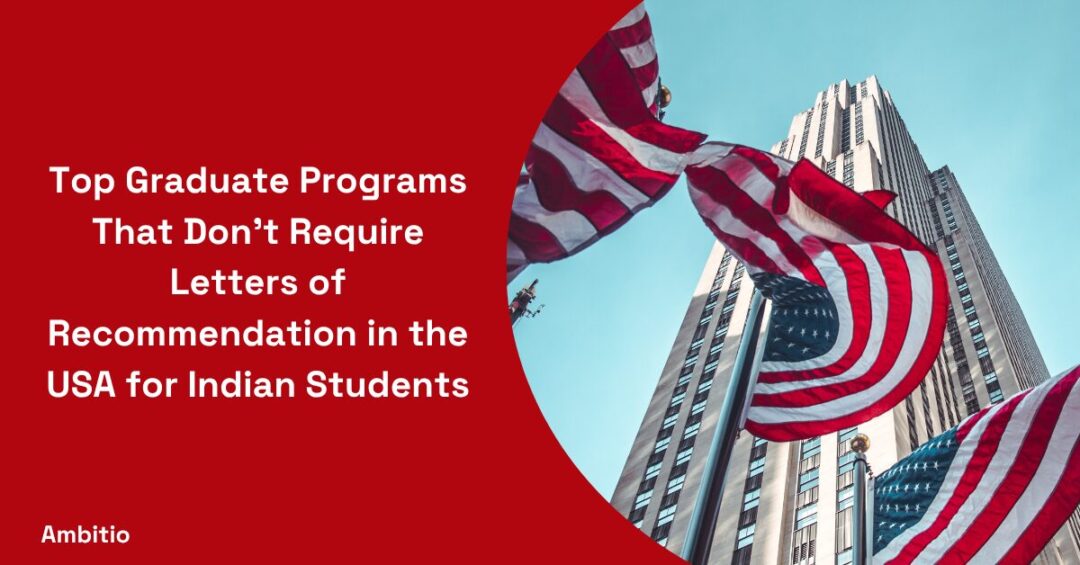8 July 2025
7 minutes read
Fraud University in USA for Higher Education for Indian Students: Student Visa Fraud and More
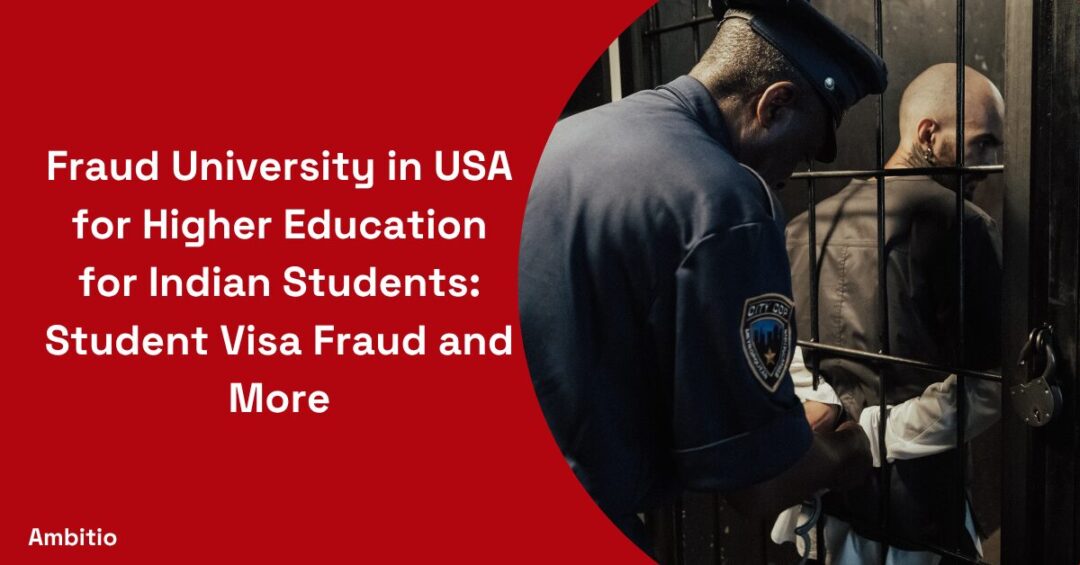
Key Takeaways
- Fraud university in USA can trap international students with fake degrees and unaccredited programmes, risking career and visa status.
- Fraud university in USA often operate without proper licensing, offering low-cost admissions that violate U.S. education laws.
- Fraud university in USA scams typically lack real campuses, academic staff, or recognition by the U.S. Department of Education.
You might have heard but did you know that in the past few years, more than 100,000 Indian aspirants have been victims of fraud in USA’s higher studies system? Such schools, which are commonly referred to as “diploma mills,” entice foreign students with false assurances of quality education and well-paying career opportunities, only to provide useless degrees and lost tuition.
Though the USA is home to more than 100 top universities in the world, getting around the complicated system of higher studies in a foreign nation is difficult enough without the further danger of coming across rogue universities.
The absence of proper accredits or accreditation and the complication of checking for the validity of institutions make many Indian aspirants easy targets for scams. This is not only spoiling their student life but also exhausting their financial resources and lowering their future hopes.
Here in this post, we have discussed 10 universities which you should avoid in the USA. And if you are already in any of these universities, we have given you some tips which you can adopt to save yourself.
Why Choose the USA For Higher Education And Why You Should Not?
Fun Fact: Universities in the USA may ask for scores of exams like IELTS, TOEFL, GRE, GMAT, SAT and ACT.
Why you should choose to study in the USA? Because it is a popular destination for higher education, attracting foreign students from around the world. American universities offer diverse masters programs, quality coursework, and excellent research opportunities.
Public colleges and universities across the country provide a strong education, preparing students for various careers. Accredited institutions ensure that students receive a legitimate and valuable education.
Reasons to Choose the USA for Higher Education:
- Diverse Academic Programs: American universities offer a wide range of programs, allowing students to find courses that match their interests and career goals.
- Quality Education: Accredited schools and colleges in the USA are known for their high standards of education and innovative research.
- Career Opportunities: The USA provides excellent curricular practical training (CPT) and post-graduation work opportunities that help students gain valuable experience.
- Cultural Experience: Studying in the USA offers exposure to diverse cultures, enhancing personal growth and global perspectives.
Reasons to Be Cautious:
- Fraudulent Institutions: Cases like the University of Farmington highlight the risk of sham universities that pose serious legal and financial threats.
- Unaccredited Universities: Enrolling in unaccredited institutions can lead to obtaining fake degrees, which are not recognized by employers or other academic institutions.
- Visa Issues: Student visa fraud and scams can jeopardize students’ legal status in the country.
- Financial Risks: Investing in a fake or unaccredited university can result in significant financial loss without any real educational benefit.
Top 10 Fraud Universities In The USA For International Students
In recent news, the case of the University of Farmington has highlighted the dangers of fraudulent institutions.
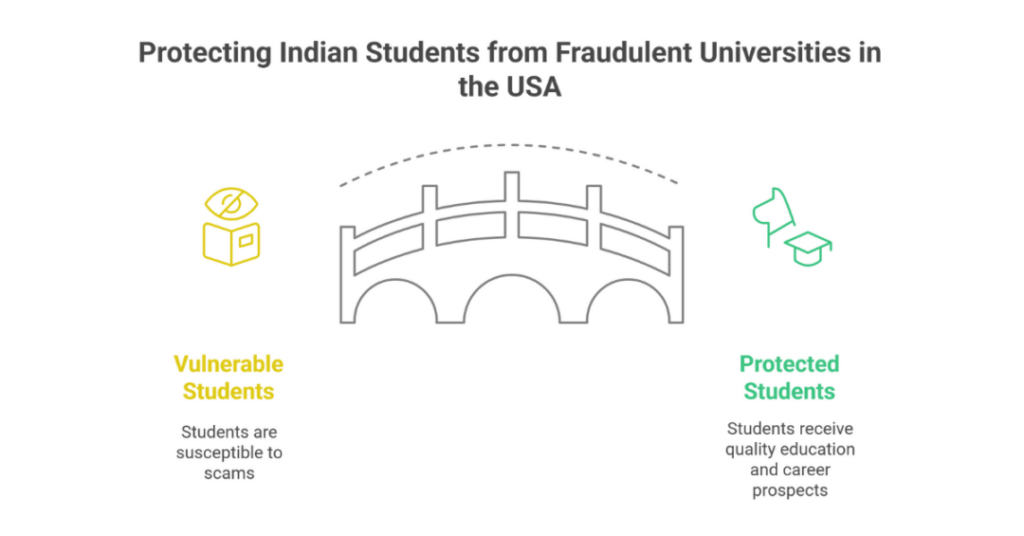
This fake university, set up by the Department of Homeland Security, led to the arrest and deportation of numerous international students, exposing the risks foreign students face when pursuing higher education in the USA.
| University Name | Location | Notable Issues |
|---|---|---|
| University of Farmington | Michigan | Sham university set up by Homeland Security; fake degrees |
| American University of Hawaii | Hawaii | Known diploma mill; unaccredited degrees |
| Columbia State University | Louisiana | Fake degrees; diploma mill |
| Trinity Southern University | Texas | Unaccredited; issued fake degrees |
| California South University | California | Unaccredited; fake accreditation claims |
| International Open University | Florida | Diploma mill; unrecognized degrees |
| University of Northern Virginia | Virginia | Visa fraud; unaccredited programs |
| Breyer State University | Alabama | Diploma mill; unaccredited |
| Rochville University | Unknown | Online diploma mill; fake degrees |
| Saint Regis University | Washington D.C. | Unaccredited; fake degrees |
Top 10 Universities In The USA Worth Studying At
These top-tier institutions are renowned for their academic excellence, cutting-edge research facilities, and diverse student communities.
While choosing the right university depends on various factors, including personal preferences and career goals, the following list highlights 10 of the most highly regarded universities in the USA.
| University | QS Ranking 2024 | Average Salary (USD) | Average Annual Fees (USD) |
|---|---|---|---|
| Massachusetts Institute of Technology (MIT) | 1 | 111,000 | 55,878 |
| Harvard University | 4 | 107,000 | 54,768 |
| Stanford University | 3 | 112,000 | 56,169 |
| California Institute of Technology (Caltech) | 6 | 106,000 | 58,680 |
| University of Chicago | 9 | 99,000 | 60,552 |
| University of Pennsylvania | 12 | 103,000 | 61,710 |
| Yale University | 18 | 102,000 | 59,950 |
| Columbia University | 22 | 105,000 | 65,524 |
| Princeton University | 16 | 100,000 | 56,010 |
| Cornell University | 13 | 98,000 | 61,015 |
How to Identify a Fraud University in USA?
“Trust, but verify.” This famous phrase rings especially true when it comes to selecting a university for higher education.
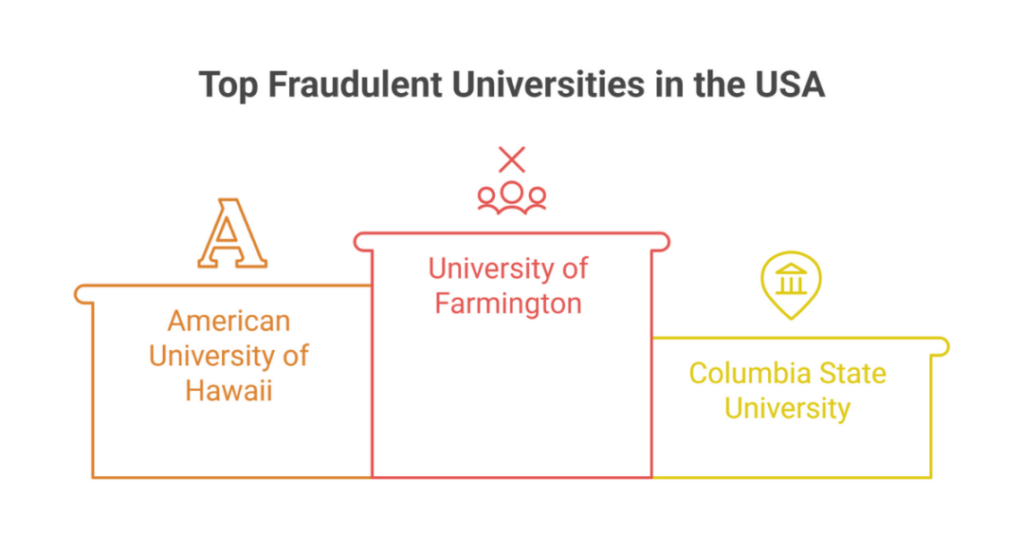
Identifying fraudulent universities can be challenging but crucial for safeguarding your academic future. Here are some key steps to help you determine if a university is legitimate or a potential scam:
Check Accreditation
Verify the university’s accreditation status through recognized accrediting bodies like the Accrediting Commission. In the USA, the Department of Education and the Council for Higher Education Accreditation (CHEA) list accredited schools and colleges. Be wary of unaccredited universities and diploma mills that issue fake degrees.
Research Online
Look up the university on credible platforms like the Chronicle of Higher Education. Search for news articles and forums discussing the institution. For instance, the University of Farmington was revealed to be a sham university created by the Department of Homeland Security, highlighting the importance of thorough research.
Consult Official Sources
Contact the U.S. Department of Education, the Better Business Bureau (BBB), or the embassy in your country, such as the embassy in New Delhi, for information on the university’s legitimacy. These organizations can help you avoid unaccredited schools and fraudulent operations.
Visit the Campus
If possible, visit the university campus. Legitimate institutions like public universities have physical campuses with proper infrastructure. Fake universities often lack real facilities, operating primarily online or through a fictitious address.
Examine Admission Practices
Be cautious of universities with overly lenient admission processes. A reputable American university will have rigorous admission standards, not guaranteeing acceptance or offering degrees with minimal coursework. Watch out for unaccredited universities that operate like diploma mills.
Evaluate the Website
A professional and informative website is a sign of a legitimate institution. Fake universities often have poorly designed websites with vague information. Ensure the university provides detailed program information and contact details.
Verify Faculty Credentials
Research the faculty members. Legitimate universities have qualified professors with verifiable academic backgrounds. Fake degrees or fictitious faculty profiles are red flags.
Check for Unusual Fees
Be wary of large upfront payments or hidden fees. Legitimate public colleges and universities have transparent fee structures and financial aid options. Fraudulent institutions often demand high fees without clear explanations.
Seek Advice from Alumni
Connect with current students or alumni through social media or professional networks. They can share their experiences and verify the university’s credibility. Avoid institutions where former students report issues like student visa fraud or academic performance discrepancies.
Trust Your Instincts
If something feels off, investigate further. Sham universities often use high-pressure tactics and unrealistic promises. For example, undercover operations by the Department of Homeland Security have led to the arrest and deportation of foreign nationals involved in fictitious university scams.
What To Do If You Are Already In One Of These Universities?
Realizing you are enrolled in a fraudulent university can be distressing, but taking swift action is crucial.
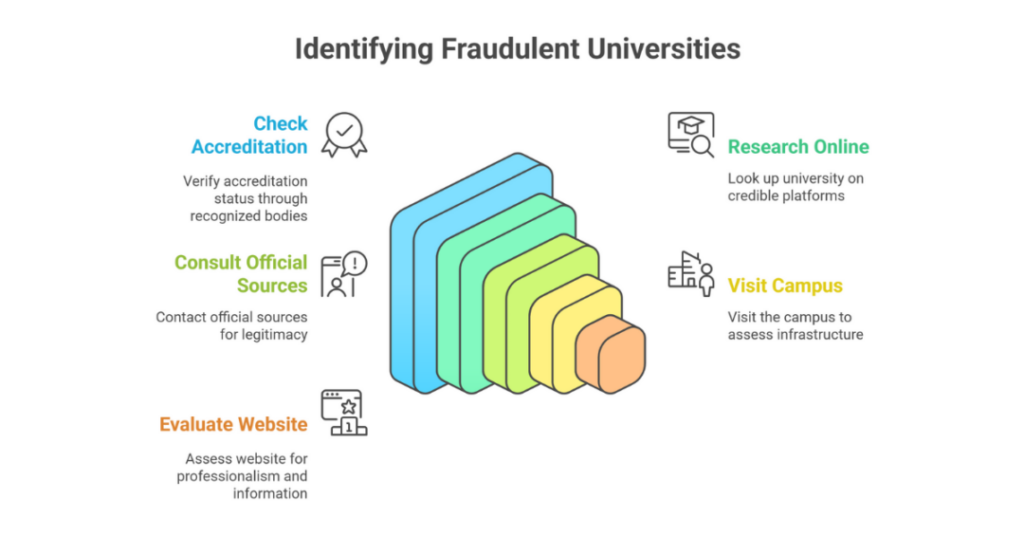
Here are the steps you should follow if you find yourself in this situation:
Contact Authorities
Immediately inform the U.S. Immigration and Customs Enforcement (ICE) and the Department of Homeland Security (DHS). They can guide you on the next steps and help prevent further victimization.
Consult an Immigration Lawyer
Seek advice from an immigration lawyer to understand your legal options and protect your student visa status. They can help you navigate the complexities of your situation and advise you on how to transfer to a legitimate institution.
Reach Out to Your Embassy
Contact your country’s embassy, such as the embassy in New Delhi for Indian students. They can provide support and resources to help you deal with the situation, including connecting you with other affected students.
Transfer to an Accredited Institution
Start researching nationally accredited and regionally accredited universities that accept transfer students. Contact their admissions offices to explain your situation and inquire about transfer options.
Gather Evidence
Collect all documents and communications related to your enrollment. This includes admission letters, payment receipts, and email correspondences. This evidence will be useful if you need to file a complaint or seek legal recourse.
File a Complaint
Report the fraudulent university to the U.S. Department of Education and the Council for Higher Education Accreditation (CHEA). This can help prevent others from falling victim to the same scam.
Conclusion
The potential pitfalls of encountering fraudulent universities underscore the importance of thorough research and due diligence. By verifying accreditation, consulting trusted sources, and staying informed, you can protect yourself from scams and ensure your academic and financial investments are secure.
Remember, your education is a significant step towards your future. Take the time to choose wisely, seek advice from credible sources, and don’t hesitate to ask questions.
The right university can open doors to new opportunities, enrich your knowledge, and set you on a path to a successful career. Stay vigilant and informed, and you’ll be well on your way to achieving your academic goals in the USA.
Explore a world of learning in the USA with Ambitio! Engage with the brightest minds, define your path, and discover your career. Join us for an adventure beyond books – Study in USA. They Secured Their Dream.
Are You Next? Dive into the success stories of students who’ve secured spots in some of the most prestigious institutions in the USA. Get inspired, compare profiles, and discover what it takes to join the ranks of these top admits.
FAQs
What is a fraud university in USA?
A fraud university in USA is an unaccredited institution that offers fake degrees or unauthorised admissions. Students at a fraud university in USA often risk deportation or visa rejection.
How can I identify a fraud university in USA?
You can spot a fraud university in USA by checking accreditation status and official U.S. education listings. A fraud university in USA usually has no physical campus or credible faculty.
What are the risks of applying to a fraud university in USA?
Applying to a fraud university in USA can lead to invalid degrees and visa denial. Many students from a fraud university in USA also face legal and financial troubles.
Has any fraud university in USA been shut down recently?
Yes, several fraud university in USA cases have led to arrests and shutdowns. Authorities frequently investigate fraud university in USA scams targeting international students.
Can studying at a fraud university in USA affect my visa?
Yes, studying at a fraud university in USA can result in F-1 visa revocation or denial. Immigration services actively monitor and blacklist any fraud university in USA.
Is it illegal to enrol in a fraud university in USA unknowingly?
While enrolling in a fraud university in USA unknowingly isn’t criminal, it may affect legal status. Victims of a fraud university in USA should report to SEVP or USCIS.
What should I do if I suspect a fraud university in USA?
If you suspect a fraud university in USA, report it to the U.S. Department of Education immediately. Avoid engaging with any fraud university in USA to protect your academic future.

You can study at top universities worldwide!
Get expert tips and tricks to get into top universities with a free expert session.
Book Your Free 30-Minute Session Now! Book a call now















